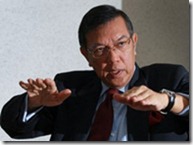Malaysia’s Employees Provident Fund, the second-largest state-run pension system in the Asia-Pacific region, plans to raise holdings of overseas investments to 30 percent by 2017 to boost returns.
The retirement fund, with 470 billion ringgit ($155 billion) in assets, is currently allowed to invest in foreign holdings as much as 23 percent of its portfolio, said Chief Executive Officer Azlan Zainol, who manages the fund. EPF’s investments abroad now account for 13 percent and will need to be increased, upon government approval, as the fund would be at least 600 billion ringgit to 700 billion ringgit in five to six years, he said.
Employees Provident Fund CEO Zainol
“We will continue to focus on areas that will give stable returns for this year and the next few years to come,” Azlan said in an interview in Kuala Lumpur yesterday. “These asset allocations that we’ve been working on have done us well and have contributed to our income reasonably well and have mitigated all kinds of risks that we are facing.”
The Kuala Lumpur-based manager posted 27.2 billion ringgit of gross income from investments last year, 13 percent more than it earned in 2010, helped mainly by realized gains in domestic and global equities, according to data published on its website.
The fund outperformed South Korea’s National Pension Service, with $305 billion, which posted a preliminary 2.3 percent return in 2011, according to the nation’s Ministry of Health and Welfare. EPF was the second-largest sovereign pension fund in Asia excluding Japan, behind the Korean fund, according to a ranking by consultants Towers Watson & Co. that was released in September.
Buying Global Bonds
EPF will start a program to buy global bonds in the second quarter to rebalance its overseas portfolio to be in line with domestic investments, Azlan said. Stocks account for about 80 percent of the overseas investments compared with 35 percent in the domestic market, he said.
The majority of EPF’s assets are currently invested onshore, primarily in government bonds. The yield on the nation’s benchmark 10-year debt is about 1.5 percentage point above similar-dated Treasuries.
“Technically, we can go up to 42 percent in equities but we don’t want to,” Azlan said. “We will try and keep it within 35 percent -- even at 35 percent, I feel you’re walking at the edge.”
EPF, which has been a net seller of domestic equities this year, plans to increase its holdings of Malaysian stocks, Azlan said. He said he likes banking, utilities, plantations and companies with high-dividend payouts, strong management and that are well-run.
“Generally, I am quite confident the market will be OK, but from certain angles, I hope there will be some troughs,” Azlan said, adding that the market’s valuations are “attractive.”
Indonesia, China
The fund’s focus will be on Southeast Asia with “the strongest growth in Indonesia over the long term,” Azlan said. EPF also has investments in the U.K., U.S., Japan and Australian stock markets, while it will invest in China through Hong Kong, he said. The fund has no plans to apply for an investment manager license in China, he said.
EPF held 124.6 billion ringgit, or 27 percent of its assets, in government bonds at the end of December, making it the single largest shareholder in that asset class in Malaysia. It also held 160.7 billion ringgit in loans and corporate bonds, 167.2 billion ringgit in stocks, 14.9 billion ringgit of money-market bills and 1.8 billion ringgit in properties.
The fund paid out 24.5 billion ringgit to members in 2011, equivalent to a 6 percent dividend rate, the most since 2000. It paid 8.5 percent between 1983 and 1987, the highest since its inception in 1952, according to data provided by EPF.
RHB Capital’s Takeover
EPF collects more than 2 billion ringgit on average every month from its 13 million members, who make a compulsory 11 percent monthly contribution while employers add another 12 percent. Membership is mandatory for working Malaysian citizens, or non-Malaysian citizens who are permanent residents.
Among the fund’s investments, Azlan expects RHB Capital Bhd.’s proposed takeover of OSK Investment Bank Bhd. to be completed by the middle of this year. The fund owns 45 percent of RHB Capital. The acquisition will be financed via a combination of new shares and cash and will reduce EPF’s stake in RHB Capital to 41 percent, he said.


























